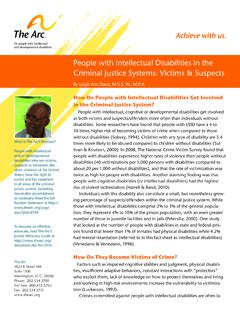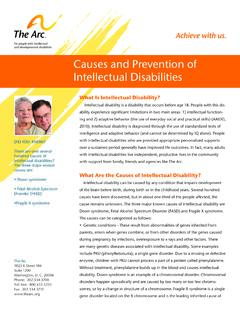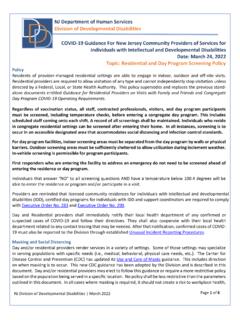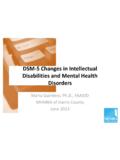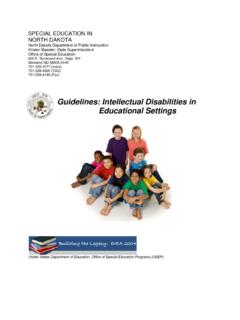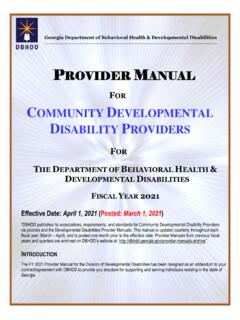Transcription of Parents with Intellectual Disabilities - The Arc
1 Parents with Intellectual Disabilities Who Are Parents with Intellectual Disabilities ? Parents with Intellectual disability or developmental Disabilities (I/DD) have various levels of cognitive impairment. An Intellectual disability occurs before age 18 and is characterized by significant limitations in Intellectual functioning and adaptive behavior as expressed in conceptual, social and practical adap- tive skills (AAIDD, 2011). Mild cognitive limitation describes individuals who What Is The Arc's Position? may have been diagnosed with an Intellectual disability at some time in their lives. They have lower than average learning, communication, judgment and The presence of an Intellectual and/ understanding abilities (Tymchuk, Lakin & Luckasson, 2001). Their eligibility for or developmental service varies from state to state, because they do not qualify for services based disability does not in itself preclude effective on having an Intellectual disability. parenting; therefore, the rights of parenthood must not be denied Why Is The Arc Concerned about Parents with Intellectual individuals soley on the Disabilities ?
2 Basis of intelellectual and/or developmental The right to marry and raise children have long been recognized as funda- Disabilities . Read the mental under the Constitution of the United States. While these rights apply to entire Position Statement Parents with Intellectual Disabilities , their parental rights are sometimes termi- at nated solely upon the determination that a parent has an Intellectual disability. Often, there is no assessment of the Parents ' actual abilities or the likelihood that they could successfully parent with appropriate supports. The Arc's position statement on sexuality states that people with I/DD have the right to make decisions about having and raising children and to have access to the proper supports on an individual basis to assist them in raising their chil- dren within their own home (The Arc, 2008). While Parents without Disabilities often receive support and ideas from other Parents , those with I/DD typically The Arc 1825 K Street NW are unable to obtain and develop such relationships that provide natural sup- Suite 1200 port.
3 Other supports provided through government programs or non-profit Washington, D. C. 20006. agencies are also scarce in most communities. Phone: Toll free: Parents who have Intellectual Disabilities may be closely scrutinized for any Fax: sign or symptom of abuse or neglect to their children. Parents live in fear of having their children taken away. Many whose children have been removed don't understand why or how to sources, training in the home to tency prevent it next time. Many others enhance generalization, appropri- Parent training adapted for Parents are not identified as having an in- ate parent models during child- with Intellectual Disabilities tellectual disability and try to hide hood, good physical and mental Help with shopping and money their disability, depriving them- health, adequate finances and low management selves of any opportunity for ac- stress and adequate education and Service coordination commodations. For those Parents reading skills. Health care, learning to deal with whose children have been taken doctors from them, the reunification plan What Are Strategies for Child care, early intervention ser- usually requires Parents to attend Successful Supports to vices counseling sessions and parent- Parents with Intellectual Mental health counseling ing classes that are not cognitively Disabilities ?
4 Counseling for substance abuse and adapted, which dooms most to McConnell, Llewellyn & Bye (1997) other addictions failure. surveyed service providers and identi- Basic academic education for par- fied four principles associated with ents Are Parents of Children effective services to Parents with I/DD. Transportation for families with Intellectual Disabili- These are: Play groups for children and Parents ties Capable of Raising Services need to be responsive to Crisis intervention services Their Children? the Parents ' individual needs and fo- Parents may need varying kinds Contrary to what many people cus on the whole family to ensure that and levels of support at different times think, people with Intellectual dis- interests of both Parents and children in their child's life. Grandparents, abilities can be good Parents . Field are served. aunts and uncles, friends and other and Sanchez (1999) suggest that Services must include long-term, family members often provide a lot the ability of a parent to provide ongoing supports because the needs of the help and support.
5 Early inter- adequate child care cannot be pre- of children change and parenting vention and/or Head Start can link dicted on the basis of intelligence skills must change as children mature. families of young children to commu- alone. As with Parents without Services must consider the special nity and natural supports. However, Disabilities , the ability to parent learning needs of the parent. Learning the family may not even qualify for successfully depends on a wide must occur in the home, be repetitive, case management services, which range of factors. Grayson (2000) use demonstration and use resources means someone needs to be creative reviewed studies attempting to that require little or no reading. in helping the family find positive identify factors contributing to Services must assist Parents in be- environments and help for the child. successful parenting. These factors coming part of their community. There is a great need for community include: higher IQ (greater than service agencies to create and provide 50 or 60), being married or living What Kinds of Supports individualized services based on each with the child's grandparents or Are Needed?
6 Family's needs. daily support from a high function- Examples of supports that help ing adult, having fewer children Parents provide appropriate care and How Are These Supports or only one, adequate motivation stimulation to their children include: Provided? and willingness to accept support In-home visits to teach parenting Several service approaches from service providers or informal skills and to assess parenting compe- have been shown to be effective For more information on this and other topics, visit individually and in combination ing, financial management, etc. References: American Association on Intellectual &. in supporting Parents and teach- Shared parenting provides full- developmental Disabilities . (2011). Intellectual ing parenting skills. These include time support when the parent and Disability: Definition, Classification, and Systems home visiting programs, parenting child live in foster care together. of Supports, 11th Edition. Washington, DC: American Association on Intellectual & Develop- groups, center-based programs The foster provider acts as a co- mental Disabilities .
7 And shared parenting models de- parent to ensure the needs of Anderson, L. & Lakin, (1998). Parents scribed below (Anderson & Lakin, children are met. with cognitive limitations: What do we know about providing support? 1998). Impact: 11(1), 6-7. In-home programs provide an What Are the Effects on Booth,T. & Booth, W. (1997). Growing up opportunity to model and teach the Child's Development with Parents who have learning difficulties. York, England: Joseph Rowntree Foundation. parenting skills in the setting of Having a Parent with Field, & Sanchez, (1999). Equal Treat- where Parents will use them. This an Intellectual Disability? ment for People with Mental Retardation: Hav- makes the skill easier for the par- Booth & Booth (1997) inter- ing and Raising Children. Cambridge: Harvard University Press. ents to learn. The service providers viewed 30 adults brought up in a Grayson, J., ed. (2000). Parents with mental can provide appropriate supports family headed by a parent or par- retardation.
8 Virginia Child Protection Newsletter. focusing on nutrition, cleanliness, ents with Intellectual Disabilities . Vol. 57. McConnell, D., Llewellyn, G., & Bye, R. safety issues and other issues re- Half of these adults had Intellectual (1997). Providing services to Parents with lated to the home. Disabilities themselves. They con- Intellectual disability: Parent needs and service Parenting groups can instruct clude that the children's destinies constraints. Journal of Intellectual and Develop- mental Disability, 22(1), 5-17. families meeting together on such are not fixed by having a mother Tymchuk, , Lakin, & Luckasson, R. topics as discipline techniques, or father with Intellectual disabili- (2001). The Forgotten Generation: The Status child development, health and ties. Their experiences in leaving and Challenges of Adults with Mild Cognitive Limitations. Baltimore: Paul H. Brookes Publish- safety issues and decision-making school to adult life were similar to ing Co. skills. Studies show that Parents other people from the same social The Arc.
9 (2008). Position Statement on consistently gain class and neighborhoods. Most of Sexuality. On-line: aspx?pid=2375. skills in this type of instruction. them maintained a valued relation- They are most successful when the ship with their families. There was Revised 3/1/11. class is followed by home visiting. little evidence of them assuming This allows Parents to practice in responsibility for parenting their the home what they have learned parent.. in class under the support and Protective factors that fostered observation of their instructor. resilience in the children are Center-based programs provide personality characteristics, such a variety of services to Parents and as responsiveness to others and children at a program site. They an outgoing nature; family char- can provide services to the parent acteristics, such as warmth and and the child jointly and separately mutuality and stability; and exter- at the same site. They are most nal supports, such as supportive effective when supplemented with relationships outside the home in-home training.
10 They typically of- and involvement in the wider com- fer a variety of services and instruc- munity. tion such as parenting skills, cook- For more information on this and other topics, visit

